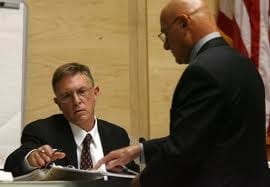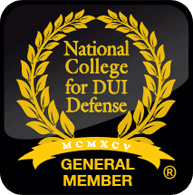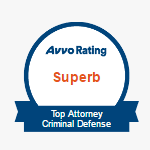The proponent of scientific evidence typically bears the burden to show the evidence is reliable.
 824 S.W. 2d 568 (Tex. Crim. App. 1992); Hartman v. State, 946 S.W.2d 60 (Tex. Crim. App. 1997)] Reliability requires proof the underlying scientific theory was a valid theory and accepted by the relevant scientific community. Secondly, there must be proof the technique applying the theory was also valid. Finally, the proponent must show the technique was properly applied in the specific case. Other reliability factors include the existence of literature supporting or rejecting the theory and technique. What was the potential rate of error of the technique? Were there other experts available to test and evaluate the theory? And finally, what was the experience and skill level of the person who applied the technique?
824 S.W. 2d 568 (Tex. Crim. App. 1992); Hartman v. State, 946 S.W.2d 60 (Tex. Crim. App. 1997)] Reliability requires proof the underlying scientific theory was a valid theory and accepted by the relevant scientific community. Secondly, there must be proof the technique applying the theory was also valid. Finally, the proponent must show the technique was properly applied in the specific case. Other reliability factors include the existence of literature supporting or rejecting the theory and technique. What was the potential rate of error of the technique? Were there other experts available to test and evaluate the theory? And finally, what was the experience and skill level of the person who applied the technique?
Even if the prosecution presents a valid scientific theory and technique, there may be other hidden problems with their forensic evidence. For instance, the College Station defense lawyer might try discrediting how the prosecution’s data was collected, handled, or stored. Did the police maintain a proper chain of custody? Did the police properly maintain the integrity of the crime scene? Are there alternate explanations for why forensic evidence points to your client?
 Keep in mind a defense attorney’s primary focus may not be directly attacking the state’s expert opinion. That’s often a loosing battle. Experts take their opinions very seriously and a criminal defense lawyer must be careful not to lose credibility with the jury by fighting losing battles. Rather, the lawyer must pick winnable engagements, or at least those which can end in a draw. Additionally, judges typically rule forensic evidence is reliable enough for admission into evidence. Although you should always look-out for “junk science” and be prepared to attack it with passion, the “reliability” issue is often another loosing battle. However, there are several aspects of reliability the lawyer can keep in mind when preparing for cross-examination. Sometimes these areas bear fruit and, at a minimum, add to your jury credibility.
Keep in mind a defense attorney’s primary focus may not be directly attacking the state’s expert opinion. That’s often a loosing battle. Experts take their opinions very seriously and a criminal defense lawyer must be careful not to lose credibility with the jury by fighting losing battles. Rather, the lawyer must pick winnable engagements, or at least those which can end in a draw. Additionally, judges typically rule forensic evidence is reliable enough for admission into evidence. Although you should always look-out for “junk science” and be prepared to attack it with passion, the “reliability” issue is often another loosing battle. However, there are several aspects of reliability the lawyer can keep in mind when preparing for cross-examination. Sometimes these areas bear fruit and, at a minimum, add to your jury credibility.
Consider a typical Bryan-College Station DWI case involving breath test machine evidence. The prosecution is trying to demonstrate your client’s breath alcohol level was over the legal limit. The breath test results indicate your client had a 0.10 BAC. However, the test was taken two hours after your client was driving. One significant issue is the BAC at the time of driving, rather than at the time of testing. We all know when alcohol is consumed it’s both absorbed and eliminated by the body over time. From the time of driving to the time of the breath test your client’s breath alcohol level was in flux. Defense attorneys must learn to use these changes to their advantage. Another technique used to attack the breath test (and other forensics) is to demonstrate how the test result was inconsistent with other evidence the jury is considering. For instance, a high breath test result may be inconsistent with how your client performed on standardized field sobriety tests. The conclusion? The forensic breath test results must be wrong!
When developing your defense it’s important to remember all machines created by man have margins of error. The computer programs used to operate the machines were written by human beings and often make assumptions about human physiology which may (or may not) apply to your client in a particular case. It’s our job to understand the margins of error and use them to our client’s advantage. Our job is to understand the assumptions built into the programs and exploit them by showing the jury things may not be what they appear.
A further example is digital computer evidence, which is common in computer- related crimes such as online solicitation, child pornography, and online harassment. What if the prosecution is attempting to link an email (or text message) to a particular computer or smart phone? What if the prosecution is aiming to connect a fraudulent Facebook page to a particular computer IP address? The defense lawyer must thoroughly understand the computer evidence involved in these prosecutions. Since most lawyers know little about digital computer evidence, the help of a trained forensic technician is invaluable and makes the difference between a competent defense and legal malpractice.
Remember, the reliability of forensic evidence is rarely the key issue. Seldom does your case hinge on the validity of the science or technique involved. The contested issues are often whether the state used the available forensic technology to meet their burden of proving your client guilty beyond a reasonable doubt or whether the police collected and preserved forensic evidence at all. If they did not, the lawyer can credibly argue the “things not done” defense and reasonable doubt. Other times you may present alternative explanations for the presence of forensic evidence at the scene. Sometimes it doesn’t matter what the forensic evidence shows since there are explanations having nothing to do with your client’s guilt. Explain it away whenever possible.







